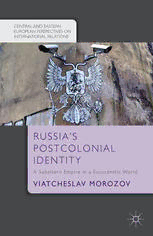Table Of ContentRussia’s Postcolonial Identity
CentralandEasternEuropeanPerspectivesonInternationalRelations
SeriesEditors
ZlatkoŠabicˇ
(UniversityofLjubljana,Slovenia)
PetrDrulák
(InstituteofInternationalRelations,Prague)
ThemainpurposeofthisseriesistoprovideandsustainexcellenceinIRResearch
inandonCentralEurope.Itaimstoprovidereaderswithhigh-qualityresultsby
scholarswhoareconductingIRresearchfromtheCentralandEasternEuropean
(CEE)perspectivesthatwillresonatewithintheIRcommunityaswellaspracti-
tionersinandbeyondtheregion.
TheseriesispurposelyinterdisciplinaryandwelcomesstudieswhichexamineIR
topicsfromtheCEEperspectivesininternationalpolitics.Theseperspectivesare
shaped by, inter alia, the experience of small states versus great powers’ inter-
ests, regionalisation, national minorities, the role of international institutions,
the position between the West and East broadly defined, as well as intellectual
traditions.
Titlesinclude:
OndrejDitrych
TRACINGTHEDISCOURSEOFTERRORISM
Identity,GenealogyandState
PetrKratochvílandTomášDoležal
THEEUROPEANUNIONANDTHEROMANCATHOLICCHURCH
PoliticalTheologyofEuropeanIntegration
ViatcheslavMorozov
RUSSIA’SPOSTCOLONIALIDENTITY
ASubalternEmpireinaEurocentricWorld
CentralandEasternEuropeanPerspectivesonInternationalRelationsSeries
SeriesStandingOrderISBN978–1–137–34600–1
(outsideNorthAmericaonly)
You can receive future titles in this series as they are published by placing a
standing order. Please contact your bookseller or, in case of difficulty, write to
usattheaddressbelowwithyournameandaddress,thetitleoftheseriesand
theISBNquotedabove.
Customer Services Department, Macmillan Distribution Ltd, Houndmills,
Basingstoke,HampshireRG216XS,England
Russia’s Postcolonial
Identity
A Subaltern Empire in a Eurocentric World
Viatcheslav Morozov
ProfessorofEU-RussiaStudies,UniversityofTartu,Estonia
©ViatcheslavMorozov2015
Softcover reprint of the hardcover 1st edition 2015 978-1-137-40929-4
Allrightsreserved.Noreproduction,copyortransmissionofthis
publicationmaybemadewithoutwrittenpermission.
Noportionofthispublicationmaybereproduced,copiedortransmitted
savewithwrittenpermissionorinaccordancewiththeprovisionsofthe
Copyright,DesignsandPatentsAct1988,orunderthetermsofanylicence
permittinglimitedcopyingissuedbytheCopyrightLicensingAgency,
SaffronHouse,6–10KirbyStreet,LondonEC1N8TS.
Anypersonwhodoesanyunauthorizedactinrelationtothispublication
maybeliabletocriminalprosecutionandcivilclaimsfordamages.
Theauthorhasassertedhisrighttobeidentifiedastheauthorofthiswork
inaccordancewiththeCopyright,DesignsandPatentsAct1988.
Firstpublished2015by
PALGRAVEMACMILLAN
PalgraveMacmillanintheUKisanimprintofMacmillanPublishersLimited,
registeredinEngland,companynumber785998,ofHoundmills,Basingstoke,
HampshireRG216XS.
PalgraveMacmillanintheUSisadivisionofStMartin’sPressLLC,
175FifthAvenue,NewYork,NY10010.
PalgraveMacmillanistheglobalacademicimprintoftheabovecompanies
andhascompaniesandrepresentativesthroughouttheworld.
Palgrave®andMacmillan®areregisteredtrademarksintheUnitedStates,
theUnitedKingdom,Europeandothercountries.
ISBN 978-1-349-48859-9 ISBN 978-1-137-40930-0 (eBook)
DOI 10.1057/9781137409300
Thisbookisprintedonpapersuitableforrecyclingandmadefromfully
managedandsustainedforestsources.Logging,pulpingandmanufacturing
processesareexpectedtoconformtotheenvironmentalregulationsofthe
countryoforigin.
AcataloguerecordforthisbookisavailablefromtheBritishLibrary.
AcatalogrecordforthisbookisavailablefromtheLibraryofCongress.
Contents
Acknowledgements vi
ListofAbbreviations viii
Introduction 1
1 ThePostcolonialandtheImperialintheSpaceandTime
ofWorldPolitics 8
2 Russiain/andEurope:SourcesofAmbiguity 38
3 MaterialDependency:Postcolonialism,Developmentand
Russia’s‘Backwardness’ 67
4 NormativeDependency:PutinitePaleoconservatismand
theMissingPeasant 103
5 ThePeopleAreSpeechless:Russia,theWestandtheVoice
oftheSubaltern 135
Conclusion 166
Notes 169
Bibliography 173
Index 199
v
Acknowledgements
My main source of inspiration for this book has been my wife Elena
Pavlova–notjustasamusebut,moreimportantly,asafellowscholar,
an expert on Latin American affairs and as the first audience and
reviewer of many ideas that ended up being discussed in this text.
Earlier drafts of individual parts of this book were presented at a num-
ber of academic events. The feedback has always been invaluable, but
I am particularly grateful to Alexander Etkind, Dirk Uffelmann and
theparticipantsoftheconferencePostcolonialApproachestoPostsocialist
Experiences, held at the University of Cambridge in February 2012.
I would also like to thank my fellow members of the PONARS Eurasia
network, which provides a friendly environment for free circulation
of all sorts of ideas, as well as the most reliable source of expertise
on an enormously wide range of topics. My colleagues at the Institute
of Government and Politics of the University of Tartu have provided
continual support and encouragement through the duration of this
project.
Some of my key arguments were formulated in my article ‘Subaltern
Empire? Toward a Postcolonial Approach to Russian Foreign Policy’
(Problems of Post-Communism 60(6): 16–28). Fragments of the article
have been integrated into the text of the book in a thoroughly revised
form.Iwouldliketoexpressmygratitudetothejournal’seditorDmitry
Gorenburg and to the anonymous reviewers for helping me to frame
my case for an audience focusing on International Relations and post-
communist studies. Another publication thatis largely a by-productof
this project appeared in Russian in the third issue of Russia in Global
Affairs in 2014. Fyodor Lukyanov, who invited me to contribute, inad-
vertently helped me to articulate some important points that I later
includedinthebookmanuscript.
Financially,my workwas supportedby theEstonian Research Coun-
cil,theEuropeanSocialFund’sDoctoralStudiesandInternationalisation
Programme DoRa, through the institutional research funding (IUT20–
39) of the Estonian Ministry of Education and Research and by the
UniversityofTartuCentreforEU-RussiaStudies(CEURUS).Someideas
thataredevelopedinthisbookwereoriginallyformulatedwhilework-
ingonanotherlargeproject–thecollectionentitledDecentringtheWest:
The Idea of Democracy and the Struggle for Hegemony (Ashgate, 2013).
vi
Acknowledgements vii
I am indebted to all contributors for the new regional and theoretical
perspectives that opened up for me while editing that volume. Spe-
cialthankstoEoinMicheálMcNamaraforbeingareliableanddiligent
proofreader. Other friends and colleagues whom I would like to thank
personallyareAys¸eZarakol,BaharRumelili,ArtemyMagunandRichard
Sakwa.
Abbreviations
BRICS Brazil,Russia,India,ChinaandSouthAfrica
CIS CommonwealthofIndependentStates
EU EuropeanUnion
G8 GroupofEight
IR InternationalRelations
LGBT lesbian,gay,bisexualandtransgender
MP MemberofParliament
NATO NorthAtlanticTreatyOrganization
NGO non-governmentalorganization
RSCT regionalsecuritycomplextheory
RT RussiaToday
UN UnitedNations
US UnitedStates
viii
Introduction
The main point this book makes is rather straightforward: I argue that
Russiamustbeviewedasasubalternempire.Thisideaisnotcompletely
new,butitsimplicationsarestrangelyoverlookedintheliterature–or,
rather,inmanyliteraturesforwhichthispointisofsomeconsiderable
significance.Theaspectthatdoesnotgetenoughattentionisofcourse
nottheimperialone–Russianimperialismhasbeenstudiedfrommany
perspectives, including those which are considered in this book. It is
thesubalternsideofRussia’sconditionthatinmyviewisnotproperly
reflected upon. This is the reason, and the only reason, why this book
stressesthesubalternpartoftheformula.Ibelievethatbothareequally
important, and most of the time, I try to demonstrate that they are
mutuallyconstitutive.However,itisonlythesubalternsidethatIanal-
yse in detail, outsourcing the examination of the imperial element to
theexistingliteratureandthereader’spriorknowledge.
In postcolonial theory, the term ‘subaltern’ refers to disenfranchised
individuals and groups, those whose agency is limited and who are
deprivedbythehegemonicsocialorderofthepossibilitytomaketheir
voices heard. Applying it to any state, let alone to one as powerful as
Russia, is certainly a controversial idea. Nevertheless, as I postulate in
Chapter 1 and substantiate in subsequent chapters, there is more than
onerespectinwhichthisconceptisrelevantfortheanalysisofRussian
politicsandRussia’spositionininternationalsociety.
I also demonstrate that Russia’s subalternity has both material and
ideationaldimensionsandthusneedstobeanalysedasacomplexphe-
nomenon.Thedualityimpliedinthisstatement,however,isanalytical
ratherthanontological:Ibelievethatinanysocialpracticethematerial
andtheideationalintermingleandconditioneachother.Thedifferen-
tiationisnecessaryfirstandforemostforthesakeofcorrectingthebias,
1

